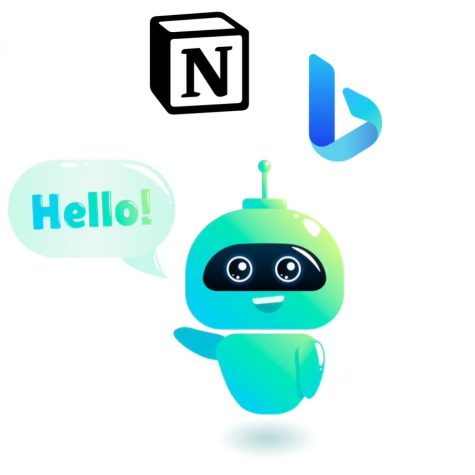A Chat with ChatGPT and Notion, Bing’s New AI, About Academic Dishonesty
May 3, 2023

The new Bing is a chatbot similar to ChatGPT. Like all chatbots, the new Bing pulls its information from the web to answer users’ questions.
Chatbots have been on the rise recently, and many students have been using these bots to cheat in school. So, what does Bing’s chatbot think of this?
I took the time to ask the AI tool myself. This transcript has been edited for length. The reporter’s explanations are italicized.
Q: Hello, I have a few questions. Could you give me your opinion on them?
A (Bing): Of course! I’ll do my best to help you. What are your questions?
A (Notion): I’d be happy to give my opinion. What are your questions?
Q: How do you feel about people using chatbots to cheat?
A (Bing): I think cheating is wrong and unfair to others. It’s important to be honest and ethical in all aspects of life. Cheating can lead to negative consequences and it’s not worth it in the long run. Is there anything else I can help you with?
A (Notion): As an AI language model, I do not have personal opinions or beliefs. However, using chat bots to cheat is considered unethical and can have negative consequences.
Cheating with chat bots can occur in various scenarios, such as in online gaming, academic exams, and social media activities. In the case of academics, it undermines the integrity of the educational system and devalues the efforts of those who have earned their qualifications through hard work and dedication. In gaming and social media, cheating can lead to unfair advantages, which can ruin the experience for other users.
In conclusion, using chat bots to cheat is unethical and can have negative consequences. It is important to uphold the principles of honesty and integrity in all aspects of our lives, including online activities.
Q: Do you think chatbots affect academic dishonesty in schools greatly?
A (Bing): Chatbots like ChatGPT are in the ‘yellow’ category of the academic honesty team’s assessment of online learning tools1. That means students should proceed with caution. Spelling out the rules—and the rationale behind them—can help prevent academic dishonesty1.
Bing assigns color codes to ethical violations. Red indicates an action is unethical, green indicates an action is ethical and yellow indicates an action is neutral.
A (Notion): The use of chatbots in schools has become increasingly prevalent in recent years. These artificially intelligent systems are designed to assist students and teachers in various educational tasks. However, one question that has arisen is whether chatbots have an impact on academic dishonesty in schools.
There are arguments for both sides of this issue. On the one hand, proponents of chatbots argue that they can reduce the temptation for students to cheat. By providing students with instant access to information, chatbots can help students better understand the material and reduce the need to cheat. Additionally, chatbots can be programmed to detect plagiarism and other forms of academic dishonesty.
On the other hand, opponents of chatbots argue that they can actually increase academic dishonesty. Chatbots can provide students with easy answers and make it more difficult for teachers to detect cheating. Additionally, students may become over-reliant on chatbots and not develop the critical thinking skills needed to succeed in their academic pursuits.
In conclusion, the use of chatbots in schools is a complex issue that requires careful consideration. While chatbots can be a valuable tool for students and teachers, it is important to weigh the potential benefits against the potential drawbacks. Only then can we determine the best way to integrate chatbots into our educational system.
Q: How could we prevent this?
A (Bing): To prevent academic dishonesty, schools can use a variety of methods. One of the most effective ways is to create a culture of academic integrity by educating students about the importance of honesty and integrity in their academic work. Schools can also use plagiarism detection software to identify instances of academic dishonesty. Additionally, teachers can design assignments that are more difficult to cheat on, such as open-ended questions or essays that require original thought. Finally, schools can create an environment where students feel comfortable reporting instances of academic dishonesty without fear of retaliation.
I hope this helps!
A (Notion): Preventing academic dishonesty requires a multifaceted approach, and chatbots can only be one part of the solution. Schools can take several measures to prevent academic dishonesty, such as promoting academic integrity, educating students on the consequences of cheating, and providing clear guidelines on what constitutes academic dishonesty. Additionally, teachers can design assignments and exams that are difficult to cheat on, such as by using open-ended questions or requiring students to show their work. Finally, schools can use plagiarism detection software in addition to chatbots to detect instances of cheating. By taking a comprehensive approach to preventing academic dishonesty, schools can create a culture of integrity and ensure that students are learning and succeeding on their own merits.
Q: Do you think chatbots are bad for students?
A (Bing): Chatbots can be helpful for students in many ways. They can provide quick and easy access to information, answer questions, and help with homework assignments. However, they should not be used as a substitute for human interaction and guidance. Chatbots can provide a great deal of assistance, but they cannot replace the value of human interaction and guidance that comes from teachers, professors, and other educational professionals.
In conclusion, chatbots can be a useful tool for students when used appropriately. They should not be relied upon as a substitute for human interaction and guidance.
A (Notion): As an AI language model, I do not have personal opinions or beliefs. The use of chat bots in academic settings to cheat on exams or complete assignments is considered unethical and can undermine the integrity of the educational system. It is important to discourage the use of chat bots for academic cheating to maintain the principles of honesty and integrity in the education system.
Q: Are you biased or are you looking at this from an objective standpoint?
A (Bing): As an AI language model, I am programmed to be objective and provide factual information. I do not have personal opinions or beliefs, nor do I have the ability to be biased. My responses are based solely on the information available to me and are designed to be as helpful and informative as possible.
A (Notion): As an AI language model, I do not have personal opinions or beliefs. Therefore, I am providing an objective standpoint on the use of chat bots to cheat. I have stated that it is considered unethical and can have negative consequences in various scenarios. Additionally, I have highlighted the importance of upholding honesty and integrity in all aspects of our lives, including online activities. Finally, I have provided a specific example of how chat bots can contribute to academic dishonesty and undermine the integrity of the educational system.
Q: Do you think there are benefits of Chatbots?
A (Bing): Yes, there are many benefits of chatbots. They can provide quick and easy access to information, answer questions, and help with homework assignments. They can also be used to provide personalized feedback and support to students. Chatbots can be available 24/7, which means that students can get help whenever they need it. They can also be used to supplement traditional teaching methods and provide additional resources for students.
In conclusion, chatbots can be a valuable tool for students when used appropriately. They can provide a wide range of benefits and help students to succeed academically.
A (Notion): Yes, there are benefits of chatbots in reducing academic dishonesty. Chatbots can help detect cheating during exams and plagiarism in students’ assignments. They can also provide instant feedback to students, helping them learn and prevent cheating. However, chatbots are not a complete solution and should be used in conjunction with other measures to combat academic dishonesty.
Q (Bing): How can we ensure that chatbots are used appropriately?
A (Bing): It is also important to ensure that chatbots are designed with appropriate safeguards in place. Chatbots should be programmed to provide accurate and reliable information and should not be used to promote cheating or academic dishonesty. They should also be designed with appropriate privacy and security measures in place to protect student data.
In conclusion, ensuring that chatbots are used appropriately requires a combination of guidance from educational professionals and appropriate design and programming of the chatbots themselves.
A (Notion): To ensure that chatbots are used appropriately, schools should establish clear guidelines for their use. These guidelines should outline the purpose of chatbots and how they should be used in the classroom. Schools should also educate students on the consequences of using chatbots inappropriately and the importance of academic integrity. Additionally, schools should monitor the use of chatbots and take appropriate action when students use them inappropriately. By establishing clear guidelines and monitoring the use of chatbots, schools can ensure that chatbots are used appropriately and for their intended purpose.
